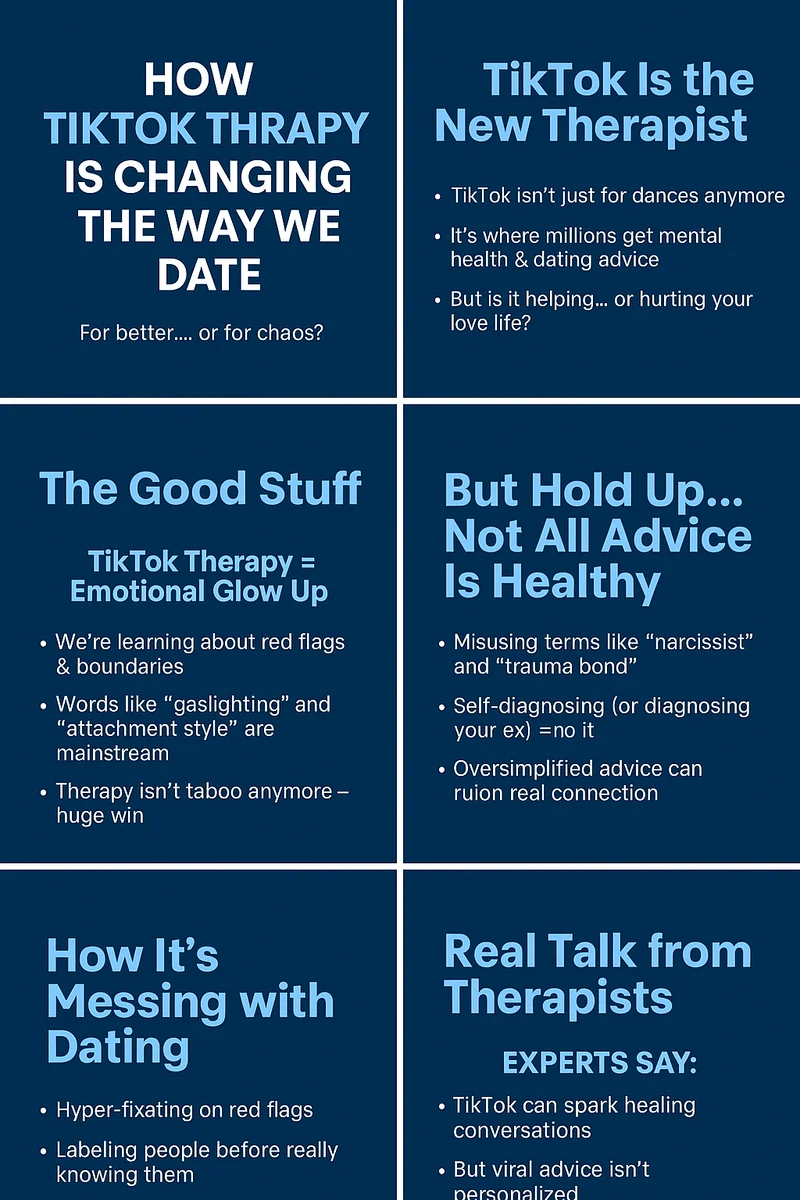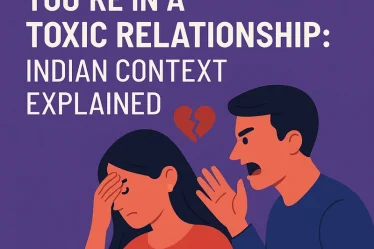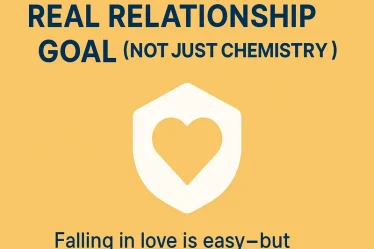
You’ve probably heard it—or even said it yourself:
“He’s definitely a narcissist.”
“That’s a trauma bond.”
“I’m anxious attached and he’s avoidant. It’ll never work.”
Thanks to TikTok, the language of therapy has gone mainstream. What used to be private therapist-office conversations are now trending hashtags, viral videos, and catchy soundbites.
Welcome to TikTok Therapy—where Gen Z learns about boundaries, gaslighting, and attachment styles between swipe-up makeup tutorials and meme edits. But as helpful as this knowledge can be, there’s a catch: not all of it is accurate… or healthy.
Let’s break down how TikTok therapy is influencing the way we date—and whether it’s helping us thrive or just overthink every text.
What Even Is TikTok Therapy?
TikTok therapy is exactly what it sounds like: creators (some licensed therapists, many not) sharing mental health advice in quick, digestible videos.
From 15-second clips about “how to tell if you’re dating a narcissist” to longer explainers about attachment theory, the algorithm is flooded with emotionally intense, pseudo-educational content. The hashtags #therapy, #mentalhealth, and #traumabond have billions of views combined.
Popular TikTok therapists like @therapyjeff and @drjulie walk the line between relatable advice and actual clinical insight—but that’s not the case for everyone. With a low barrier to entry, anyone can go viral talking about psychology—even if they have zero qualifications.
The Good: Emotional Literacy, Faster Than Ever
Let’s give credit where it’s due. TikTok therapy has made emotional education more accessible. For many of us, this is the first time we’ve even heard words like “emotional availability” or “gaslighting” outside of a psychology textbook.
Here’s what it’s doing right:
- Helping people spot red flags: Knowing what love bombing or toxic control looks like can help people leave unhealthy relationships sooner.
- Normalizing therapy talk: It’s no longer taboo to discuss therapy, trauma, or emotional needs in public.
- Encouraging boundaries: Many users report feeling more confident setting limits in relationships after learning how from creators.
- Empowering daters: Understanding your attachment style (anxious, avoidant, etc.) can lead to more self-awareness and empathy in dating.
Basically, it’s like free therapy—except bite-sized and on your FYP.
The Bad: Oversimplified, Overused, and Often Wrong
Now for the not-so-fun part: not all TikTok therapy is good therapy.
While some creators genuinely try to help, others oversimplify complex psychological topics or throw around terms for clicks.
Here’s where it gets dicey:
- Everyone’s diagnosing everyone: Calling someone a narcissist because they ghosted you? That’s not how clinical narcissism works.
- Therapy buzzwords get weaponized: “You’re triggering my inner child” or “I’m setting boundaries” is sometimes just code for avoidance or emotional shutdown.
- It creates fear around normal conflict: Not every disagreement means your relationship is toxic.
- People start self-diagnosing: Without real therapy, it’s easy to misunderstand your own mental health.
In short, TikTok can educate—but it can also confuse the hell out of you.
How It’s Changing Dating—for Real
So what happens when millions of people start filtering their dating life through therapy-TikTok?
Here’s what we’re seeing:
- Red flag obsession – People are hyper-vigilant, scanning every message or date for signs of toxicity.
- Attachment style labels – Daters label themselves and others before really getting to know them.
- Avoidance disguised as healing – Blocking or ghosting someone might be framed as “protecting peace,” but sometimes it’s just emotional immaturity.
- Perfection pressure – TikTok creates this image of what a “secure” or “healed” partner should look like, making real connection harder.
Dating has become less about learning with someone and more about analyzing them.
What Therapists Say About All This
Mental health professionals are very aware of the TikTok therapy boom—and they have mixed feelings.
What they like:
- It opens the door for conversations about trauma, emotions, and healing.
- It’s getting more people into real therapy.
What they worry about:
- Misinformation spreading fast.
- People using psychological terms they don’t fully understand.
- Users internalizing advice that doesn’t actually fit their unique situation.
A quick quote from an actual therapist:
“TikTok can be a gateway to self-awareness, but it’s not a substitute for therapy. People need guidance, not just soundbites.” – Dr. Vanessa Kennedy, clinical psychologist
How to Use TikTok Therapy Without Losing Your Mind (or Your Relationship)
Let’s be honest: TikTok isn’t going anywhere. So instead of avoiding it altogether, learn to engage with it critically.
Here are some golden rules:
- Follow licensed professionals – Check credentials before trusting someone’s advice.
- Don’t diagnose yourself or your partner – Labels can be damaging and often incorrect.
- Take trends with a grain of salt – Just because it’s viral doesn’t mean it’s valid.
- Apply, don’t over-apply – Use TikTok insights as a tool, not a rulebook.
- Seek real therapy – TikTok is a conversation starter, not a solution.
Final Thoughts: Swipe Wisely
TikTok therapy has completely transformed how Gen Z talks about dating—and there’s a lot to love about that. Emotional intelligence is cool now. Therapy is trendy. And being self-aware is a flex.
But while bite-sized wisdom can help, relationships aren’t algorithms. Love takes nuance, communication, and real-world experience—not just soundbites and scripts.
So yes, enjoy your FYP. Learn. Reflect. Grow.
Just remember: real relationships happen offline.
FAQs: How TikTok Therapy Is Shaping Dating Beliefs
Q1. What is TikTok therapy?
TikTok therapy refers to the widespread sharing of mental health advice, terminology, and emotional wellness tips on TikTok. While some creators are licensed professionals, many are not, which can lead to both helpful insights and misinformation.
Q2. How is TikTok therapy influencing Gen Z’s dating behavior?
TikTok therapy is making Gen Z more emotionally literate, helping them recognize red flags and normalize mental health conversations. However, it can also encourage over-labeling, unrealistic expectations, and avoidance of healthy conflict in dating.
Q3. Is it safe to take relationship advice from TikTok?
Some advice can be helpful, especially when shared by licensed therapists. But users should be cautious of oversimplified or viral content from unqualified creators. It’s best to verify tips with a professional or use TikTok as a starting point—not a final answer.
Q4. What are the downsides of TikTok therapy in dating?
Common downsides include misdiagnosing partners, overusing terms like “narcissist” or “trauma bond,” avoiding conflict under the guise of “protecting peace,” and placing unrealistic expectations on oneself or others to be completely healed before dating.
Q5. Can TikTok therapy replace real therapy?
No. While TikTok can raise awareness about mental health, it doesn’t provide personalized treatment or professional diagnosis. Real therapy involves context, nuance, and professional guidance that short-form content simply can’t offer.



